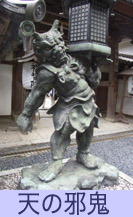 During my seven years in Japan I was occasionally accused of being an “Amanojaku” (see here and here). And indeed the Amanojaku seems to be part of my temperament. The Japanese characters literally mean: Heaven-[‘s]-Evil-Demon.
During my seven years in Japan I was occasionally accused of being an “Amanojaku” (see here and here). And indeed the Amanojaku seems to be part of my temperament. The Japanese characters literally mean: Heaven-[‘s]-Evil-Demon.
To the right is a Japanese Buddhist temple statue of an amanojaku. The Amanojaku is a mischievous, if not outright evil, demon in Japanese folklore and Shintoism which through syncretism, entered Japan’s Buddhism where they are symbolized as either defeated by the Buddhist guardian deities or servants of them.
However, in conversational Japanese the appellation “Amanojaku” is used as a descriptive jab [sometimes kiddingly, sometimes not] toward someone who is felt to be argumentative to the extent that they are always deliberately take a contrary position. A poor and certainly less-colorful English equivalent would be to call someone a “contrarian”. But while “contrarian” has an emotional pejorative tone, Amanojaku also has a playful, mischievous but ironically protective image too.
In Japanese Buddhism demons are often employed (like gargoyles) to scare away evil. These apparently evil creatures are actually on the side of the good. And thus likewise, may I plea for an occasional positive way to look at us amanojakus. Maybe we can consider a virtuous amanojaku as someone who refuses to accept consensus conclusions and embraces skepticism. This amanojaku takes seriously Horace’s admonition of “Sapere aude” (Dare to Discern). He is willing even to doubt the consensus of the skeptic’s sacred turf — science.
This week at Reasonable Doubts, an excellent study compares personalities of CFI Michigan members (a skeptic club) with local church goers. The Big 5 Personality Traits were compared. And low and behold, Skeptics were found to be less “Agreeable” — meaning Skeptics are generally Amanojakus. So maybe we are not such virtuous creatures but just reflexively being ourselves. The trick, I guess, is not for the Amanojaku to change themselves, but (as Japanese Buddhism has done), for the listener to know how to use the Amanojaku.
I agree, us Amanojakus can be a bit of a nuisance and cause silly ruckuses, but with a bit more discernment, we can be found to be rather cute. 🙂




































Thank you. That was interesting.
The English phrase that comes to mind is “devil’s advocate.”
@ Sylvia,
Thanks for stopping in. Yes, that is close, but “Devil’s advocate” lacks a little of the playful side, and of the heavenly side that Amanojaku captures!
Both the Devil and the Advocate (“Lawyer”) don’t really have positive images in this culture. Whereas in Japan, they are temple deities!
Thanks for the info. I used it when writing my book Amanojaku, a different interpretation, but inspired by the myth. I’ve added a link to this page on my site as reference. Thanks for sharing 🙂
In case you’re interested, here is the book:
Now that is interesting! Very good to know and remember.
Glad you enjoyed, Jade.